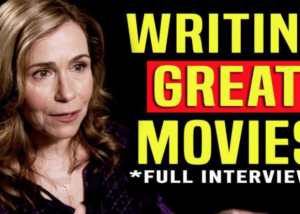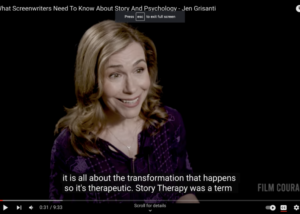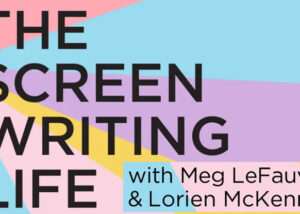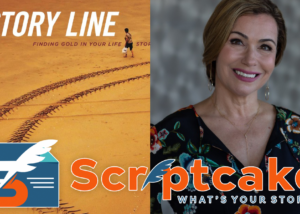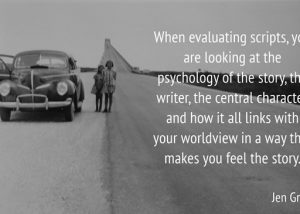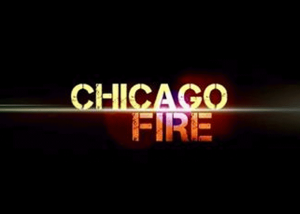Meet the Reader: Jen Grisanti
“Our wounds are the well we should draw from.” Consultant and writing instructor Jen Grisanti discusses the key concepts of a great script, and why movies and TV matter.
By Brianne Hogan.
Jen Grisanti has always been fascinated with film and TV. For her, it was the escapism and wish fulfillment of it all that ignited her love for story.
“I remember seeing The Hardy Boys when Joe Hardy’s girlfriend, Jamie, died. I still remember the song “If” by Bread that played. The story stuck with me because of the way that it made me feel.”
It’s her dedication to emotional resonance that makes Grisanti such a sought-after script consultant. Her two books, Story Line: Finding the Gold In Your Story, and Change Your Story, Change Your Life: A Path to Success, illustrate her passion for helping writers grow from their own personal narrative as they align their personal and professional selves.
A former assistant to Aaron Spelling, Grisanti climbed the ranks and eventually ran Current Programs at Spelling Television Inc., covering all of Spelling’s shows including Beverly Hills, 90210, and Charmed. In 2004, Jen was promoted to Vice President of Current Programs at CBS/Paramount where she covered shows including Medium, Numb3rs, and NCIS. In 2008, she launched her own consultancy firm, and when she not’s busy helping talented writers break into the industry, she’s also a writing instructor for NBC’s Writers on the Verge. This year alone, she’s participating in The Big Island Film Festival, The TV Writers’ Summit, The Story Expo, Comic Con, Wonder Con, and The Great American Pitchfest.
Despite her hectic schedule, Creative Screenwriting was able to catch up with Grisanti to discuss what she loves most about her job, the key concepts of a great script, and why movies and TV matter.
Why do movies and TV matter?
Movies and TV matter because they often share a strong message about the human experience. They bring us to a higher place of consciousness with better understanding the hero’s journey. Through story, we see that everyone faces obstacles on their way to a goal. We see and root for the hero to get over his/her obstacles. This transforms the way that we see obstacles in our own lives. It helps us to understand how to be more engaged in our own lives and more active heroes in our own stories.
How did you get into the script consulting business?
I got into the script consulting business when I hit a crossroads in my life. I had been a studio executive at two sister companies for over 15 years when I was told that my contract was not being picked up for another term. This happened on the heels of a professional disagreement. I was a VP at the time and in mid-pursuit of what I thought was my career destiny, running a studio. I was forced to redefine my path. In the moment, I thought that this pitfall was one of the worst things that could happen, but it ended up being one of the best things that could have happened. It took that moment of loss for me to realize and take steps toward founding a business built on the things I loved most about working in film and TV: working with writers, and developing story.
I had to go through an exploration of: if I wasn’t Jen Grisanti the studio executive, who was I? I’d done my job diligently for 15 years. I’d fully committed to the process. In the moment I found out my contract wasn’t being renewed, it felt like my dream was taken from me. I knew that I could continue to climb the ladder at other companies. I also knew that if I did that, I’d be putting my destiny back into someone else’s hands. At this point in my professional life, I knew that I had a strong reputation and that the community empathized with my loss. Since I had staffed many writers and loved that about my work, I knew that I wanted to find a new way to be of value to that community, one that could be on my own terms.
So, I went to CAA and spoke with their business development people. CAA had represented Aaron Spelling, who was my mentor for 12 years before he passed away. I told CAA about a software idea, and an idea for a writers’ consultancy. They liked both ideas. They recommended that I do the writers’ consultancy first and get known as an entrepreneur in addition to being a studio executive. They also recognized that I had successfully staffed over 15 primetime shows and that my experience had value to the market.
I had the good fortune of having my contract paid out so I had the money to start my own business. I knew that it was now or never. So, even though, it was in the middle of the writers’ strike in 2008, I jumped off the biggest cliff of my career and started Jen Grisanti Consultancy Inc. The writers’ strike actually worked for my business. On the day of my launch, I sent my new website out to 900 people from my Rolodex. I received 175 emails in those first 24 hours. During the first week, I booked 20 meetings. This was the start of a beautiful new journey. I began to see that by building a business around my strength, story development, I was doing what I loved, and I was helping to facilitate writers’ dreams.
When I started my business, I recognized that my success would depend on the results that I got. I meditated on and visualized my clients getting results. Over the past 7 years, I’ve had over 55 of the writers that I’ve worked with get staffed. I’ve had 31 sell pilots, 5 of which have gone to series.
With this experience, I turned what I once thought was my “all is lost” moment into a trigger that would propel me to blaze a path with passion for doing what I loved the most, developing story.
What do you love about: a) your job in general, and b) script reading, in particular?
One of the many things that I love the most about my job is seeing the arc of growth of the writer. I love to see how when I introduce them to new tools it can make a massive difference in the way that they approach story. There is nothing more rewarding than when you come across a writer who sees and embraces the process and understands it in a way that brings their writing to a whole new level. This is when results happen.
I love having the flexibility to do what I love and to do it with people that are driven by the same passion for story that I have.
What I love about script reading is that you can take any story and elevate it so that it is the best that it can be. As a Current Programs executive, it was my job to make story the best that it could be before it hit the air. So, you could take a script that wasn’t very strong and move it to the strongest place that it could be so that the show could be a success. I approach reading the scripts of my clients in the same way. I think about them as something that could very possibly someday be on the air. I use the knowledge and expertise that I gained from some of the top talent in the business to help get writers to where they need to be so that their success can happen.
The great thing about being a writer is that you can write your way into a job. An actor or a director doesn’t have this power. So, as a consultant to writers, I understand that the only thing between the writer and their working career is a story that hits it out of the ballpark. This fuels my passion for script reading.
Who do you usually consult for?
I work with writers at all levels. I work with newer writers as well as working writers from staff to Co-Executive Producer level. I think that a large part of this is due to the fact that I staffed over 15 shows. I developed a creative trust with writers that have worked with me in the past and valued my feedback.
Writers contact me when they’re building their writing portfolio, when they’ve sold or are about to sell a pilot and want to make sure that it’s the best that it can be, when they are staffed and they want to write another great pilot or spec script that will keep their career going, when they are staffed and they want to stay staffed, etc.
What is your process like when you sit down with a script for the first time? What are you looking for?
When I read a script for the first time, I begin by reading it once through just to know what the story is and where it’s going. Then, I read it a second time and make my notes. I often read it a third time to make sure that I covered all the bases and to see if anything else comes to mind that will help to elevate the story.
What I look for is strong structure and elevated emotion. I want to feel the inner story as well as the external story. With the opening, there should be a powerful question that comes out of it. I want to be dying to know the answer to this question. If written well, the resolution will answer this question. I look for strong internal and external stakes. I look for a well-crafted personal dilemma that is connected to the professional pursuit. I look for whether or not I feel the story and understand what the writer is trying to say with it.
What are the key components that make up a great script?
The components of a great script are:
- Set up of World and life before the trigger incident
- A Strong series trigger and dilemma (this is for the TV pilot script)
- A strong pilot trigger, dilemma and pursuit that are strongly linked to the series dilemma.
- The central character should take an action in each act toward the goal, hit an obstacle and there should be a reminder of the stakes.
- A strong external and internal stakes arc.
- Strong act breaks that end on an obstacle due to an action that the central character took toward the goal.
- The voice of the writer. I want to feel what they’re trying to say with the story.
- A strong link between the “all is lost” moment and the action that the central character takes at the top act that leads toward the achievement of the goal.
- A symbolic moment when the goal is achieved.
- A resolution that answers the question coming out of the opening dilemma.
I read that when you work with writers, you discuss emotional well-being and assisting with the emotional work to heal. What does that entail, and how does that help them with their writing?
I do a ton of work with the wound/wounds of the writer. Our wounds are the well we should draw from. These moments are where our voice lives. So, I do a lot of work with writers on accessing their wounds and then drawing their emotional truth from these wounds and discussing how they can add fiction to it in their writing. This is a very big part of the process I teach. I believe that if you don’t know how to access your wounds, you are not writing from your core and your soul. As strange as it may sound, the parts of ourselves that make us the most unique are what connect us to each other in a universal way. If you understand your wounds, the audience will better connect with what you’re trying to say with the stories that you tell.
I have had tremendous breakthroughs with helping writers to understand their wounds. When writers understand how to integrate their wounds into their writing, they suddenly write that pilot script that hits it out of the ballpark and gets sold or gets them staffed.
I believe that our wounds are the key to our success in story and in life. When you lead with the wound, connection happens.
You discuss in your books moving from ego to spirit. How does this apply in TV or feature films?
At the beginning of story, the hero often wants to achieve the goal for ego related reasons. It is only after he/she hits several obstacles on the way to the goal that they become humbled. When the hero is humbled by their obstacles, the achievement of their goal takes on a deeper meaning. They wake up to the fact that the achievement of the goal isn’t just about them, it’s about contributing to the greater good.
In Story Line: Finding Gold In Your Life Story, I write about Ryan’s character from the film Up In the Air.
Ryan wants to achieve a goal at the beginning of the story for ego related reasons. He doesn’t want to stop flying because this means that he’ll lose his single lifestyle, and it threatens his belief in going through life with an empty backpack. After hitting hurdles and being humbled by them, Ryan understands that his belief no longer serves him. This marks his movement from ego to spirit. At the midpoint, Natalie tells him that he puts himself in a “cocoon of self-banishment.” Then, he goes to see his sister and tells her that he will walk her down the aisle. She tells him that she already has someone walking her down the aisle. He goes to see Alex, his love interest, and discovers that she’s married and has a family. These actions reflect his growth of moving from ego to spirit.
We see through the theme of detachment how Ryan moves from ego to spirit. It is symbolically shown with the visual of the empty backpack that Ryan uses at his motivational talks to help communicate his philosophy. This becomes clear by lines such as: “The slower we move, the faster we die.” It helps us understand why Ryan thinks and feels the way that he does. It also explores the idea of mortality. We learn through the story how being “grounded,” or shall we say being “attached,” represents the beginning of the end for Ryan. Through the story, we see Ryan go from fully believing in his philosophy of being detached to beginning to see the value of commitment. This is articulated visually and symbolically when we see that Ryan is no longer able to give his talk with his empty backpack. He no longer believes in his own philosophy. Another strong visual symbol that connects us to his journey is the cardboard figures he carries around of his sister and her fiancé to take pictures with in different locations. It’s like Ryan was carrying his biggest fear with him: the idea of commitment. When he gets to their wedding and thinks that he’s done this miraculous thing by taking all these pictures in different locations as a way to show his sister that he does care, he’s disappointed to see that there are hundreds of other pictures that people took that made his contribution seem small in comparison. It was a reminder to him of what could be. The beauty of this symbolism is that it helps us to understand who Ryan is and why he acts the way that he does.
One of my favorite exercises in Story Line was identifying my Universal Life Moments. Can you talk about what they are, and what makes them so vital to the stories we tell?
A “universal life moment” is a moment when your world turns upside down and your sense of reality, as you know it, shifts. Often times, this is an “all is lost” moment. Your life has changed. You are put in a position of choice. You can take action, or you can choose to stay where you are, but either way, your reality will never be the same again.
Universal life moments, if you learn how to use them in your writing, are the glue that connects you to your audience. They are where your voice lives. We are often wounded during our universal life moments. Your wounds give you something to say. This is when you start to feel and understand your emotional truth. Your emotional truth is your gold as a writer. It is what separates and defines you from all other writers. It is your unique thumbprint.
Could you illustrate the five components that you discuss in your book, Change Your Story, Change Your Life: A Path To Your Success, with regards to motivation? I think it’s an essential piece of a character’s journey, but I find that it can be difficult to understand and/or tackle.
The Five Components are
- Desire
- Wound & Flaw
- External Stakes
- The Past
- Moving Forward and Evolving
DESIRE
The first part of motivation is being able to understand what you want. What is your life goal? Many writers have trouble writing goals for their central characters because they don’t know what they want in their own life. When you understand desire, you understand what you want.
WOUND & FLAW
I do a lot of work with writers on understanding their wounds. When you understand your wounds, you understand your voice. This is pivotal in your success as a writer. I recently worked with a writer who told me that she always tends to write toward the teen audience. I asked her why this was, what was her wound? She immediately responded, “My wound is emotional abandonment.” She went on to say that her mother had too many kids too soon. Two of her siblings were diagnosed with Aspergers. Her mom was in denial about this. So, this forced the writer to be the parent to her siblings at a young age. I started to ask her about the other scripts in her portfolio. She suddenly realized that all of her scripts had the theme of emotional abandonment. So, by her understanding her wound and the flaws that came from it like pleasing people, she was able to build the stories that she tells around this.
When you understand your wounds and your flaws in your own life and the lives of the people around you, you are able to write them for your characters. Our wounds are part of what motivates us toward a goal. This goes with the idea of moving toward pleasure and away from pain.
When I lost my job, the wound that motivated me was the recognition that if I went to work for someone else on the next tier of the corporate ladder, my destiny would once again be in someone else’s hands, and the same thing could happen again. I wanted to create my own destiny. This led me to creating Jen Grisanti Consultancy Inc.
EXTERNAL STAKES
When we identify what is the worst that can happen on an external level if we do not achieve our goals, this can fuel us to move toward our goal.
So, if you want to be a working writer. Think about: what is the worst that can happen if you don’t attain this? On an external level, this could mean never being able to buy a home, not being able to put your kids through private school, etc. These are external things that you may want to create the picture of the future that you want. So, when you have them in mind, you can use them to motivate you toward your goal.
THE PAST
Your past is your blueprint for what worked and what did not work. By understanding the choices that you made in your past that led to outcomes you may not have wanted, you can use your knowledge to motivate you in a different direction.
MOVING FORWARD AND EVOLVING
When you go through things like divorce, loss of a job, a breakup, a death, etc., you want to move away from pain and toward pleasure, but you have to heal in order to do this successfully. Part of healing is the recognition that your ego is often what motivates you toward a goal. When we go through loss, we begin to wake up and become more conscious of this. We start to see that the achievement of our goals can be about contribution to the greater good. When we become more aware of this, we are able to utilize this to move us toward our goals while evolving and elevating ourselves to a higher place of consciousness.
How important is it that writers are honest with themselves about their own “all is lost” moments and why?
Your “all is lost” moments give you a reason to start over. They often represent the end of one story and the beginning of another. So, be open to a new beginning. With your “all is lost” moment, you have two choices, you can be a victim to the fall or you can become and active hero in your own story. When you rise above the fall, you see the opportunity to begin again and grow.
This is important to writers because understanding their “all is lost” moments gives them something to draw from. My process in working with writers is to first understand the writers’ personal story. I want to understand what has transpired in their life that has given them something to say. I also want to see how accessible they are to their well and the wounds that have happened in their life. I encourage writers to build their writing portfolio around their wounds and their emotional truth. This helps to establish why they are the perfect writer for the stories that they are telling.
At the end of Story Line, you ask, “What message are you sending out?” How important is it for writers to have a message? And why? How do we begin to find our “message”?
Your message defines what you want to say with your story. By understanding what you want to say with your story, your message forms. Sometimes, this is conscious. Sometimes, it is subconscious. I think when you have a clear sense of what you’re trying to say with your story. It helps you to write from a deeper place. This is important because it helps us to feel your story and to see you in the stories that you tell.
You begin to find your message by thinking about your why behind your what. Why do you want to tell your story in the way that you do? What inspired it? What do you want to leave behind with it? What do you want your audience to feel? What is the significance of what you are trying to say? By thinking of these things, you will find your message.
What are some common mistakes you find while reading scripts from emerging writers?
Some of the most common mistakes made by writers are
- Not creating enough empathy for their lead from the start
- Not having a powerful enough trigger and dilemma to start their story
- Having a central character that is more reactive than active
- Having soft act breaks that don’t end in jeopardy to the goal
- Not having a strong external/internal stakes arc.
At which point in the writing and editing process should a writer approach you for your help?
I work with writers at all levels. I like working with writers from concept, to outline to script. It allows me to really help them work through their creative process.
I also love working with writers when they finish their scripts. They do not need to have their script in perfect shape before they come to me. They can send it to me when they finish their first draft. This allows us to really dive into the work.
I also have writers come to me that want to redevelop a pilot that they did in the past. I love doing this as well.
The best point to turn to a consultant is when you know that you want to take your script to the next level and you’re ready to do the work. Or, you know that you have a strong idea, but you don’t know how to execute it in the strongest way possible.
What should an aspiring writer do everyday to get to the employable/professional level?
They should take action. When you write down the goals in your life just as you write down the goals in your story, think of all of the actions that you can take toward the goal.
Five actions that writers can take everyday are:
- Write.
- Live your life to the fullest so that you have something to write about.
- Absorb the world around you and soak in the messages.
- Read scripts, read books, read newspapers, read trade papers.
- Watch the news and documentaries.
When is a script “good enough” to make the rounds? Enter contests, fellowships, submit to agents, etc.
This is where the writer has to trust the intuition. You have to trust when it is ready. In my experience, this takes writing and rewriting through several drafts. It takes sending it out to a professional and receiving strong feedback. It is all about doing the work to get your story where it needs to be. When you’ve received strong feedback from a number of sources, trust that the script is ready.
Bottom line is that there will always be development that can be done. However, you can get it to the strongest place possible based on the skills that you have.
What film(s) and TV show(s) do you think have a well-crafted screenplay?
| FAVORITE TV SHOWSLuther
The Good Wife Homeland Masters Of Sex The Americans The Blacklist Scandal House Of Cards Mad Men Breaking Bad The Wire |
FAVORITE FILMSThe Lives Of Others
The King’s Speech The Imitation Game Birdman Whiplash Guardians Of The Galaxy The Intouchables American Beauty Good Will Hunting Braveheart Up In The Air Crazy, Stupid Love |
What’s the biggest piece of advice you can give to an aspiring screenwriter?
Write. Live. Meditate. Visualize. Believe.
And what’s the biggest piece of advice you’ve received as a writer?
When I was writing my first book, the best advice I received was to look at my table of contents. Then, think of a conversation that I’d want to have about the title of each chapter. This advice was pivotal for me.














